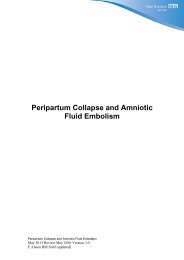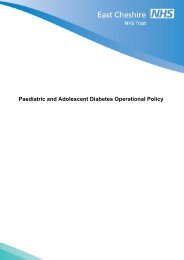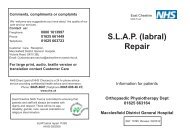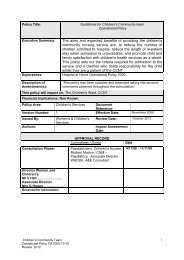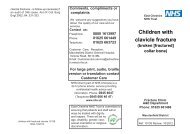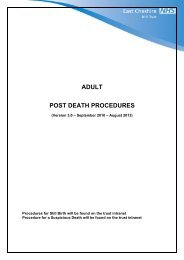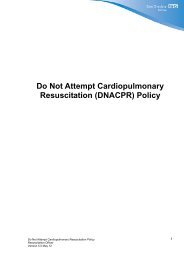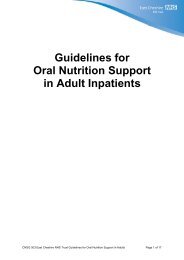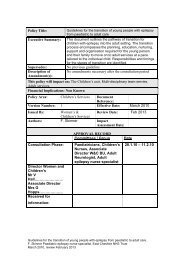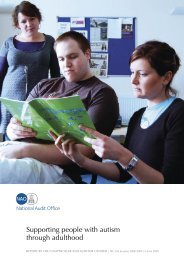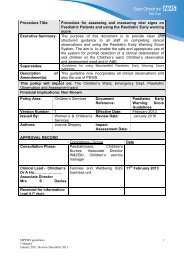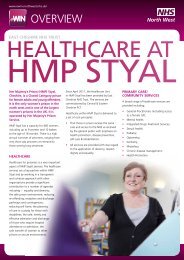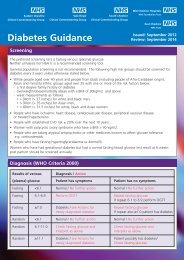Wheeze - East Cheshire NHS Trust
Wheeze - East Cheshire NHS Trust
Wheeze - East Cheshire NHS Trust
You also want an ePaper? Increase the reach of your titles
YUMPU automatically turns print PDFs into web optimized ePapers that Google loves.
<strong>Wheeze</strong>Information for parentsChildren’s WardPhone no: 01625 661080www.eastcheshire.nhs.ukMacclesfield District General Hospital@eastcheshirenhsRef: 10007 Review: 08/2015P a g e | 1
IntroductionYour child has had an episode of wheeze. This is very common in youngchildren and many children grow out of it as they get older.What is wheeze?A wheeze is the whistling noise that air makes when it is trappedinside the breathing tubes of the lungs.In many young children you can hear a ‘ruttly’ noise. This is not awheeze as it is the mucus that they are not able to cough away. Lots ofpeople find it difficult to know the difference between this ‘ruttly’ noiseand wheeze. <strong>Wheeze</strong> can be heard coming from within the chestwhereas a ‘ruttle’ comes from the back of the throat.Why do they wheeze?Young children have very small breathing tubes in their lungs. Whenthey catch a virus, or something irritates the tubes, they becometighter and leave a smaller airway through which to breathe. The tubesmay also become swollen inside and produce mucus. The tighteningof the tubes makes it hard for the young child to breathe out. Theymay also cough to try to get rid of the mucus.Which children wheeze?Any child may have episodes of wheeze.The most common cause iswhen children get a cold, or virus. Following an infection calledbronchiolitis (caused by a virus), episodes of wheeze are more likely forsome months afterwards.Children in contact with cigarette smoke are more likely to wheeze.P a g e | 2
Can I stop it happening?You can try to keep your child away from cigarette smoke. You cannotstop them getting a virus and it is not a good idea to try to keep themaway from other children.Does it mean my child will have asthma?Many children have wheezy episodes in the first few years of life but donot go on to have asthma. However, some young children who wheezedo develop asthma when they get older. We are not sure whichchildren will become asthmatic.What do I do when my child becomes wheezy?You may have been given an inhaler for your child. This works byopening up the tight breathing tubes. You can give it to your child whenthey wheeze or start with a cold. You do not need to give it to your childwhen they are well.Inhaled treatmentName ____________________________________________________ puffs ( __________ mcgs)_________times a day.Use this dose regularly for a few days until the symptoms havesettled.Treatment by mouthName ____________________ strength _________________ Dose_________________ times a day _________________Name of doctor/nurse ________________________________Signature ____________________date _________________P a g e | 3
How to use a spacer1 Settle and seat your child.2 Shake the inhaler well.3 Put the inhaler in the end of the spacer.4 Put the inhaler between the child’s lips and teeth, or place themask firmly over the nose and mouth.5 Press the inhaler down once.6 Count 6 normal breaths in and out (listen for the valve clicking orthe valve moving)7 Remove the device from your child’s mouth or face8 Repeat the process if required.For each puff, shake before each dose and leave at least 30seconds between doses.It is very important to use the spacer device you have been givenfor your child, or the inhaled medicine will not reach your child’slungs. If you are having difficulty giving treatment, ask for helpfrom your practice nurse, or the hospital asthma nurse.Contact numbersMrs Jane Taylor, Macclesfield District General Hospital VictoriaRoad, Macclesfield SK10 3BLPhone: 01625 661855Children’s Ward, Macclesfield District General HospitalVictoria Road, Macclesfield SK10 3BLPhone: 01625 661080Asthma UKWebsite: www.asthma.org.ukReferenceshttp://www.patient.co.uk/doctor/Wheezing-in-children.htmP a g e | 4
Comments, compliments or complaintsWe welcome any suggestions you have about the quality of ourcare and our services.Contact us:Freephone: 0800 1613997Phone: 01625 661449Textphone: 01625 663723Customer Care, Reception,Macclesfield District General Hospital, Victoria Road,SK10 3BLFor large print, audio, Braille version or translation contactCommunications and Engagement on 0800 195 494.Admission informationThe trust accepts no responsibility for the loss of, or damage to,personal property of any kind, in whatever way the loss ordamage may occur, unless deposited for safe custody.Please leave valuables at home. If you need to bring personalitems that are expensive, for example micro hearing aids, pleasebe aware that you do so at your own risk<strong>East</strong> <strong>Cheshire</strong> <strong>NHS</strong> <strong>Trust</strong> iscommitted to ensuring ethat patientsand staff will always be treated withdignity and respect. There will be noage, disability, gender, race, sexualorientation or religious discrimination<strong>NHS</strong> Direct (part of <strong>NHS</strong> Choices)is a 24 hr phone advice serviceproviding confidential health adviceand information. Phone: 0845 4647(Textphone 0845 606 46 47)www.nhs.ukP a g e | 5



